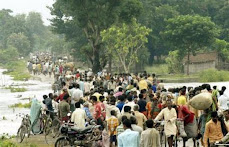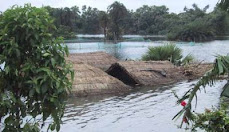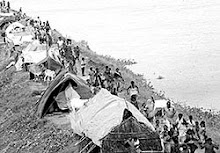-Gross injustice has been done to Bihar by not giving any special package to flood victims of Kosi region on the pattern of tsunami and Aila victims.
-Infrastructure project development firm KNR Constructions on Wednesday said the company in consortium with two other firms has bagged a project worth Rs 225.27 crore from the Bihar Government for renovation of Eastern Kosi Canal System. The company’s 50:25:25 joint venture with JKM Infra Projects and Kamala Constructions has been awarded the contract by the Bihar Government for extension, renovation and modernisation of Eastern Kosi Canal System, KNR Constructions said in a filing to th e Bombay Stock Exchange (BSE).
Hyderabad based KNR Constructions (formerly K Narasimha Reddy & Co.) is an infrastructure development company, based in Andhra Pradesh, which provides engineering, procurement and construction management services across the roads and highways, irrigation and urban water infrastructure sectors.
-In the year of Kosi disaster about 1,20,000 hectares of land went under water in August, 2008 destroying not only the kharif crop but also sharply reducing the rabi acreage.
-Principal Accountant General, a Constitutional body has in its report held the improper work by the state Water Resources Department responsible for the breach in the Kosi embankment. Nitish Kumar government is now questioning the authority of the Principal Accountant General (PAG). "PAG does not have the power to govern. If the report comes to me then I will see what action can be taken. But there can be no action based just on reports," says Bihar Water Resources Minister Bijendra Yadav.
The Principal Accountant General (Audit), Bihar, Arun Kumar Singh observed that the lack of sincere approach in protection work by the state Water Resources Department (WRD) led to the breach in the eastern Kosi embankment near Kusaha on August 18, 2008. The PAG has observed that the Water Resoures Department, Bihar ignored the proposals of the Head, Works and Eastern Kosi Embankment Divisions, Birpur regarding protection work on vulnerable sites of the embankment and took no steps to protect it, the flood protection works were centred mainly on spurs and the embankment remained untouched. The PAG also noted that there was lack of coordination between Nepalese and Indian administrations on the safety measures of the Kosi project area.
The exit conference on the audit, which was held on December 17, 2009 the PAG said that WRD did not furnish reply to queries of his office on certain points on the pretext of the constitution of inquiry commission under the chairmanship of retired Justice Rajesh Balia, by the government of Bihar to inquire into the facts of the Kosi breach. But the denial of reply was violation of Regulation-13 on audit and accounts relating to scope of audit.
-Nationalist Congress Party National Media Convenor Suraj Yadav’s petion to Prime Minister the PMO vide PMO ID No 1/3/2009-PMP 1/87862 dated 2nd November 2009 has informed the petitioner that the petition has been forwarded to Secretary,Ministry of Home Affairs,Govt of India, “for action as appropriate”.
Prof. Suraj Yadav had petitioned to National Human Rights Commission in September 2008 demanding an inquiry into the Kosi Tragedy and to fix the responsibility for this human sponsored tragedy which had cast doom for lakhs of people in nearly eight districts of Bihar.
Historically, floods and their control have never been a big issue in the Ganga-Brahmaputra basin, as it is today. Floods became a major issue after the British occupied India. When they examined the Ganga basin, they believed that if it could be made “flood-free”, they could levy a tax in return for such protection.
Saturday, 20 March 2010
Crop Failure in Kosi Region
Bihar State Assembly proceedings came to a grinding halt on March 16, 2010 after Opposition party MLA’s kicked up a storm over the ruling NDA government’s alleged failure to address the issue of maize crop failure in the flood-afflicted Kosi belt.
Pandemonium prevailed during the zero hour when Akhtar-ul Imam of the RJD declared the maize crop in the Kosi belt to be “a total failure” while accusing the government of “displaying gross insensitivity” by failing to address the plight of maize cultivators along the Kosi region.
Mr. Imam charged the State Government of not taking adequate measures to compensate farmers “who were being forced to take the extreme step of committing suicide following severe crop failure”.
When the State Government failed to provide a satisfactory reply, Opposition MLAs from the Rashtriya Janata Dal (RJD), the Congress and the Left parties stormed the well, brandishing stalks of maize in their hand, demanding that a thorough inquiry be conducted to assess the damage suffered by farmers.
The session resumed only after speaker Mr. Uday Narayan Chaudhary assured the Opposition that the matter would be taken seriously, while directing the Government to conduct a thorough investigation into the affair.
Agriculture Minister Ms. Renu Kuswaha later told newsmen that the Government “was trying to ascertain whether the failure had been brought on by the bad quality of seeds or by inclement weather.”
Purnia, one of the worst flood –hit districts in the Kosi belt, has over 12,000 hectares under maize cultivation. Owing to floods, farmers in the belt are increasingly opting for maize cultivation due to the high yield promised by the crop, instead of the traditional paddy and jute harvesting.
Last week, forty-year old Jagdish Sharma of Mohinipur village in Katihar district committed suicide while Mohammad Nazim of Purnia attempted to take his life, after their maize crop had failed.
The kin of both these small-margin farmers claimed that “heavy debt,” made worse by “continual crop failure” had driven them to take an extreme step.
However, when contacted, the SP of Katihar denied that the maize crop had failed in the region and said that Sharma’s death had been caused “as he had accidentally inhaled a pesticide”.
On the other hand, Purnia District Magistrate N Shravan Kumar, who has admitted to the failure of the maize crop, has indicated that poor quality seeds may have caused it.
Earlier, BJP MP from Katihar, Mr. Nikhil Chaudhary had also promised that he would urge the Bihar government to address the plight of the small-margin farmers besides raising the issue in Parliament.
The Hindu
Pandemonium prevailed during the zero hour when Akhtar-ul Imam of the RJD declared the maize crop in the Kosi belt to be “a total failure” while accusing the government of “displaying gross insensitivity” by failing to address the plight of maize cultivators along the Kosi region.
Mr. Imam charged the State Government of not taking adequate measures to compensate farmers “who were being forced to take the extreme step of committing suicide following severe crop failure”.
When the State Government failed to provide a satisfactory reply, Opposition MLAs from the Rashtriya Janata Dal (RJD), the Congress and the Left parties stormed the well, brandishing stalks of maize in their hand, demanding that a thorough inquiry be conducted to assess the damage suffered by farmers.
The session resumed only after speaker Mr. Uday Narayan Chaudhary assured the Opposition that the matter would be taken seriously, while directing the Government to conduct a thorough investigation into the affair.
Agriculture Minister Ms. Renu Kuswaha later told newsmen that the Government “was trying to ascertain whether the failure had been brought on by the bad quality of seeds or by inclement weather.”
Purnia, one of the worst flood –hit districts in the Kosi belt, has over 12,000 hectares under maize cultivation. Owing to floods, farmers in the belt are increasingly opting for maize cultivation due to the high yield promised by the crop, instead of the traditional paddy and jute harvesting.
Last week, forty-year old Jagdish Sharma of Mohinipur village in Katihar district committed suicide while Mohammad Nazim of Purnia attempted to take his life, after their maize crop had failed.
The kin of both these small-margin farmers claimed that “heavy debt,” made worse by “continual crop failure” had driven them to take an extreme step.
However, when contacted, the SP of Katihar denied that the maize crop had failed in the region and said that Sharma’s death had been caused “as he had accidentally inhaled a pesticide”.
On the other hand, Purnia District Magistrate N Shravan Kumar, who has admitted to the failure of the maize crop, has indicated that poor quality seeds may have caused it.
Earlier, BJP MP from Katihar, Mr. Nikhil Chaudhary had also promised that he would urge the Bihar government to address the plight of the small-margin farmers besides raising the issue in Parliament.
The Hindu
Worst Environmental Crisis of South Asia
Kosi's drainage crisis is the worst environmental and public health crisis in South Asia. I have returned from Kosi region on 15th March, 2010. Let me flag three things:
1. A Commission of Inquiry was constituted by the Government of Bihar under the chairmanship of Justice Rajesh Balia, Retired Chief Justice, Patna High Court to enquire into the causes of breach in the Eastern Kosi Afflux Bund on 18th August 2008 so as to prevent occurrence of such disaster in future. TOR of this Commission is right in looking at the Kosi crisis since 1953. TOR should include India-Nepal treaty as well. Commission is faced with non-cooperation from government
Departments. Kosi is waiting for yet another disaster in August-September 2010
2. So-called solutions to Kosi crisis such as High Dam in Nepal, Interlinking of Rivers within Bihar and more embankments would aggravate the crisis
3. UPA-1 manifesto promised to work to solve the drainage crisis of North Bihar (& Nepal) but so far it has not done anything
1. A Commission of Inquiry was constituted by the Government of Bihar under the chairmanship of Justice Rajesh Balia, Retired Chief Justice, Patna High Court to enquire into the causes of breach in the Eastern Kosi Afflux Bund on 18th August 2008 so as to prevent occurrence of such disaster in future. TOR of this Commission is right in looking at the Kosi crisis since 1953. TOR should include India-Nepal treaty as well. Commission is faced with non-cooperation from government
Departments. Kosi is waiting for yet another disaster in August-September 2010
2. So-called solutions to Kosi crisis such as High Dam in Nepal, Interlinking of Rivers within Bihar and more embankments would aggravate the crisis
3. UPA-1 manifesto promised to work to solve the drainage crisis of North Bihar (& Nepal) but so far it has not done anything
Subscribe to:
Posts (Atom)







